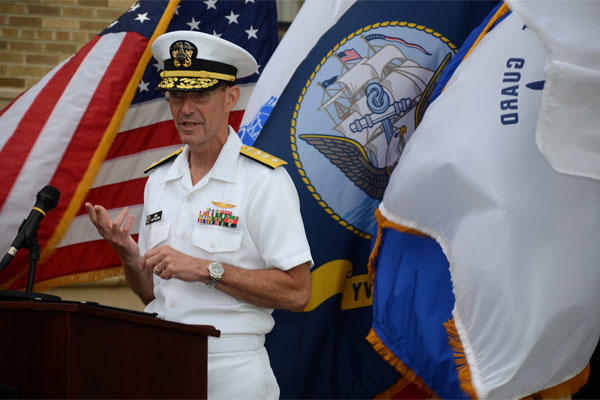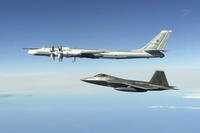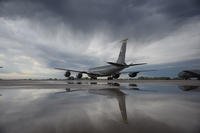WASHINGTON-- The Navy's deputy surgeon general and deputy chief, Bureau of Medicine and Surgery (BUMED), retired June 14 after a military career that spans more than 33 years of service.
In Navy tradition, Rear Adm. Michael H. Mittelman's flag was hulled down during a formal ceremony attended by senior and junior military members, civilian guests, family and friends at the Sail Loft on the Washington Navy Yard, D.C.
"When you look at the breadth of his career, the amazing telescopic view he's had of the Navy, the military, and the joint world in addition to what he's been able to bear throughout his career, it really is an amazing accomplishment," said Vice Adm. Matthew Nathan, U.S. Navy surgeon general and chief, BUMED.
Nathan added that in his last role, Mittelman was a compelling representative and co-leader of Navy Medicine.
"This ceremony is fitting for an officer of his caliber and for contributions he's made," said Nathan.
Mittelman, a native of Long Beach, N.Y., has held the position as deputy surgeon general and deputy chief of BUMED since November 2011.
The rear admiral began his Navy career as a staff optometrist in 1980 at Naval Hospital Cherry Point, N.C. In June 1989, he became the first Navy optometrist to earn designation as an Aerospace Optometrist (NAsO).
He took command of Naval Hospital Okinawa, Japan in July 2000, becoming the first optometrist to command a naval hospital. Additionally, Mittelman is the first and only clinician to serve as the 15th director of the Medical Service Corps (MSC). He was the only non-physician to serve as a combatant command surgeon for U.S. Pacific Command and the first at U.S. Joint Forces Command.
In addition to his series of firsts, Mittelman served in a variety of additional assignments and command positions across the Navy Medicine enterprise including Pensacola, Fla.; Great Lakes, Ill.; Washington, D.C.; Yorktown and Norfolk, Va.; Honolulu; Rota, Spain; as well as Okinawa, Japan.
"I got my first hop in a Marine EA-6B while stationed in Pensacola," said Mittelman. "That cemented my love for aviation."
At each duty station, Mittleman added, they [his family] met some amazing folks, who made a real impact on their lives and that has helped to make the Navy such a uniquely gratifying and rewarding career.
Though command has taken him out of regular clinical operations, treating great patients and being able to mentor junior Sailors is what has kept him motivated and dedicated.
"Don't be afraid to get out of your comfort zone and take some calculated risks," Mittelman said. "Take care of your people, be honest and have fun, it's the only way you'll grow professionally."
According to the rear admiral, one of his most significant accomplishments was his involvement in Operation Tomodachi, the United States' military medical response to the earthquake, tsunami and nuclear reactor crisis in Japan in 2011.
During his time as command surgeon for Pacific Command, Mittelman and his team were responsible for ensuring the health safety of residents in the region as well as monitoring the air, food, soil and water for contaminates.
In addition, they collaborated with the joint multinational disaster relief effort. Mittelman and his Navy Medicine team provided radiation health support, established a registry to document radiation exposure estimates for more than 70,000 Department of Defense affiliated personnel on or near the mainland of Japan and laid the foundation and established new science protocols for dealing with these type of situations.
Mittelman thanked Nathan and Dr. Jonathan Woodson, assistant Secretary of Defense (Health Affairs) and director of TRICARE Management Activity, for their leadership and friendship. He added, Navy Medicine and the military health system are in great hands because of them, great officers and enlisted who keep Sailors, Marines and all service members healthy and on target for readiness.
Mittelman's awards and decorations include: Defense Superior Service Medal (two awards), Legion of Merit Medal (five awards), Meritorious Service Medal (three awards), Navy and Marine Corps Commendation Medal (two awards), Navy and Marine Corps Achievement Medal, Meritorious Unit Commendation (two awards), National Defense Service Medal, Global War on Terrorism Service Medal, Navy and Marine Corps Overseas Service Ribbon (five awards), and the Navy Expert Pistol ribbon.
As the U.S. Navy Deputy Surgeon General, Mittelman helped lead a global health care network of 63,000 Navy medical personnel around the world who provide high-quality health care to more than one million eligible beneficiaries. Navy Medicine personnel deploy with Sailors and Marines worldwide, providing critical mission support aboard ship, in the air, under the sea and on the battlefield.





























